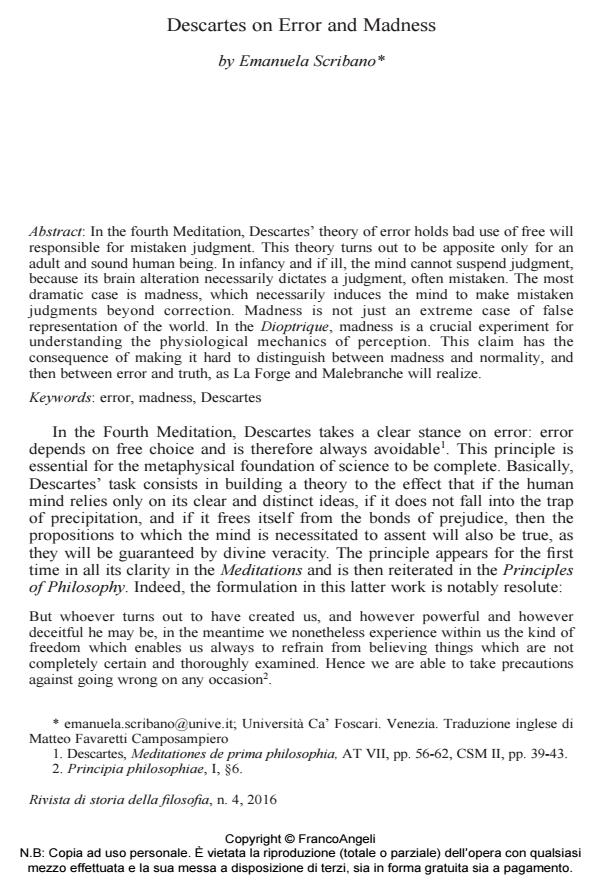Descartes on Error and Madness
Journal title RIVISTA DI STORIA DELLA FILOSOFIA
Author/s Emanuela Scribano
Publishing Year 2016 Issue 2016/4
Language English Pages 15 P. 599-613 File size 53 KB
DOI 10.3280/SF2016-004004
DOI is like a bar code for intellectual property: to have more infomation
click here
Below, you can see the article first page
If you want to buy this article in PDF format, you can do it, following the instructions to buy download credits

FrancoAngeli is member of Publishers International Linking Association, Inc (PILA), a not-for-profit association which run the CrossRef service enabling links to and from online scholarly content.
In the fourth Meditation, Descartes’ theory of error holds bad use of free will responsible for mistaken judgment. This theory turns out to be apposite only for an adult and sound human being. In infancy and if ill, the mind cannot suspend judgment, because its brain alteration necessarily dictates a judgment, often mistaken. The most dramatic case is madness, which necessarily induces the mind to make mistaken judgments beyond correction. Madness is not just an extreme case of false representation of the world. In the Dioptrique, madness is a crucial experiment for understanding the physiological mechanics of perception. This claim has the consequence of making it hard to distinguish between madness and normality, and then between error and truth, as La Forge and Malebranche will realize.
Keywords: Error, madness, Descartes
- Heidegger frente a Husserl en la Introducción a la investigación fenomenológica Hernán Gabriel Inverso, in Estudios de Filosofía /2017 pp.49
DOI: 10.17533/udea.ef.n56a04 - Conceivability Errors and the Role of Imagination in Symbolization
Lucia Oliveri, in JoLMA /2021
DOI: 10.30687/Jolma/2723-9640/2021/02/002 - Discurso, exclusión y locura en Descartes Benito Arbaizar Gil, in Revista de Filosofía (Madrid) /2022 pp.1
DOI: 10.5209/resf.72650
Emanuela Scribano, Descartes on Error and Madness in "RIVISTA DI STORIA DELLA FILOSOFIA" 4/2016, pp 599-613, DOI: 10.3280/SF2016-004004